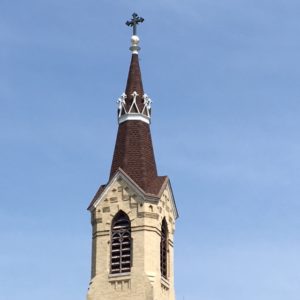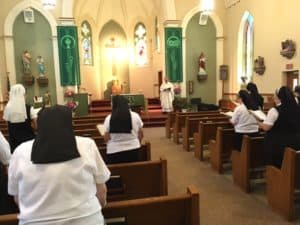For your prayer and contemplation, we share a Franciscan Gospel reflection and questions written by Fr. Paul Gallagher, OFM for the Nineteenth Sunday in Ordinary Time. They are edited by Franciscan Sister of Christian Charity Sister Anne Marie Lom and Joe Thiel. The excerpts from the Sunday readings are prepared by Joe Thiel. To read or download the complete pdf with excerpts for your prayer, please click here: Franciscan Gospel Reflection August 12 2018. Excerpts from the Lectionary for Mass for Use in the Dioceses of the United States of America, second typical edition © 2001, 1998, 1997, 1986, 1970 Confraternity of Christian Doctrine, Inc., Washington, DC. Used with permission. All rights reserved. No portion of this text may be reproduced by any means without permission in writing from the copyright owner. Please include this information when printing.
Photos: beginning of Franciscan Sisters of Christian Charity, St. Mary Church Clarks Mills, Wisconsin
John 6:41-51
The Jews murmured about him because he said, “I am the bread that came down from heaven,” and they said, “Is this not Jesus, the son of Joseph? Do we not know his father and mother? Then how can he say, ‘I have come down from heaven’?” Jesus answered and said to them, “Stop murmuring among yourselves. No one can come to me unless the Father who sent me draws him, and I will raise him on the last day. It is written in the prophets: ‘They shall all be taught by God.’ Everyone who listens to my Father and learns from him comes to me. Not that anyone has seen the Father except the one who is from God; he has seen the Father. Amen, amen, I say to you, whoever believes has eternal life. I am the bread of life. Your ancestors ate the manna in the desert, but they died; this is the bread that comes down from heaven so that one may eat it and not die. I am the living bread that came down from heaven; whoever eats this bread will live forever; and the bread that I will give is my flesh for the life of the world.”
Background
The gospel text from last Sunday concluded with Jesus making the assertion that “I am the bread of life; whoever comes to me will never hunger, and whoever believes in me will never thirst.” (John 6:35) In the verses between last week’s text and the gospel for this week, Jesus also makes a number of other bold statements, the last of which is “For this is the will of my Father, that everyone who sees the Son and believes in him may have eternal life, and I shall raise him on the last day.” (John 6:40)
The text for this week opens with the Jews murmuring against Jesus because he has made the claim that “I am the bread that came down from heaven.” They seem to have taken issue with the part of Jesus’ statement that he has “come from heaven.” Some of them knew his father and mother. To them, Jesus is claiming that he is more important than they know him to be. In the United States, to come from humble beginnings and to rise to greatness is consistent with the United States being a place of opportunity for everyone. Anyone can rise from a humble beginning to be a great success in government, business, entertainment, sports, etc. The very opposite is true for the culture in which Jesus lived, where one’s family determined one’s personal worth and honor. To strive to rise above one’s birth status was looked down upon. It threatened the social fabric on which a fragile system of survival was based. The Jews’ response to Jesus’ claim was a familiar form of public debate in their time.
In the gospel text for today John connects the incident with the Exodus experience of the Jewish people by using the word “murmur.” It is the same word used in Exodus to describe the Jews complaining to God. That led to their being fed with manna. Jesus’ response to their complaint meets their challenge in a way that will either enhance his honor or that of his challengers. He too uses the word “murmur,” he reinforces the connection to Exodus, and he will draw on that Exodus experience in verse 49 to further unfold his teaching to them.
Jesus’ claims in verses 44-45 draw on the prophets who stated that it is God who must initiate the people coming to him. Therefore, if they have difficulties with Jesus, then it must be that they have a difficulty with God. They are not accepting “the one whom God has sent.” Only those whom God draws will be drawn to Jesus. Jesus has come down from heaven, and he will draw those whom God has sent to him back to God on the last day. As the text continues, Jesus makes the further claims, in verse 46, that he is the only one who has seen the Father, and finally, in verses 48-51, that he is the bread of life. Unlike the Jews in the Exodus who ate the bread that came from the sky and merely avoided starvation, anyone who eats this bread will live forever.
Those who hear this text today might assume that Jesus’ statements about being the “bread of life” are references to Jesus’ presence in the Eucharist. Those that would have heard this interchange between the Jews and Jesus would not have heard these statements in that light. They would have been familiar with other places in their tradition where the Wisdom of God is presented as food or bread. (Proverbs 9:5, Sirach15: 3) Those present could have understood Jesus’ statement, in verse 51, that the living bread God gives is “my flesh for the life of the world” would mean the human body of the person of Jesus.
Reflection Questions
1. When I hear the argument between Jesus and the crowd in today’s gospel I…
2. When I think of bread, some of the things that come to mind are…
3. Do you recall people making claims of success or experiences that you found just too much to believe? How did you respond to their claims?
4. What do you hear Jesus telling you when he says “I am the living bread come down from heaven?” How do you respond?
5. What is it that you hunger for?
6. How is God nourishing to you?
7. Can you take some time to talk with God about his desire to be the bread of life for your hungers, or for the hungers of the world?




